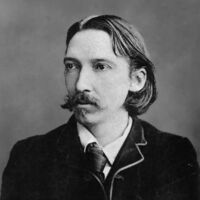Underwood: Note
The human conscience has fled of late the troublesome
domain of conduct for what I should have supposed to be the
less congenial field of art: there she may now be said to
rage, and with special severity in all that touches dialect;
so that in every novel the letters of the alphabet are
tortured, and the reader wearied, to commemorate shades of
mis-pronunciation. Now spelling is an art of great difficulty
in my eyes, and I am inclined to lean upon the printer, even
in common practice, rather than to venture abroad upon new
quests. And the Scots tongue has an orthography of its own,
lacking neither “authority nor author.” Yet the temptation is
great to lend a little guidance to the bewildered Englishman.
Some simple phonetic artifice might defend your verses from
barbarous mishandling, and yet not injure any vested interest.
So it seems at first; but there are rocks ahead. Thus, if I
wish the diphthong ou to have its proper value, I may write
Oor instead of our; many have done so and lived, and the
pillars of the universe remained unshaken. But if I did so,
and came presently to doun, which is the classical Scots
spelling of the English down, I should begin to feel uneasy;
and if I went on a little farther, and came to a classical
Scots word, like stour or dour or clour, I should know
precisely where I was - that is to say, that I was out of
sight of land on those high seas of spelling reform in which
so many strong swimmers have toiled vainly. To some the
situation is exhilarating; as for me, I give one bubbling cry
and sink. The compromise at which I have arrived is
indefensible, and I have no thought of trying to defend it.
As I have stuck for the most part to the proper spelling, I
append a table of some common vowel sounds which no one need
consult; and just to prove that I belong to my age and have in
me the stuff of a reformer, I have used modification marks
throughout. Thus I can tell myself, not without pride, that I
have added a fresh stumbling-block for English readers, and to
a page of print in my native tongue, have lent a new
uncouthness. Sed non nobis.
I note again, that among our new dialecticians, the local
habitat of every dialect is given to the square mile. I could
not emulate this nicety if I desired; for I simply wrote my
Scots as well as I was able, not caring if it hailed from
Lauderdale or Angus, from the Mearns or Galloway; if I had
ever heard a good word, I used it without shame; and when
Scots was lacking, or the rhyme jibbed, I was glad (like my
betters) to fall back on English. For all that, I own to a
friendly feeling for the tongue of Fergusson and of Sir
Walter, both Edinburgh men; and I confess that Burns has
always sounded in my ear like something partly foreign. And
indeed I am from the Lothians myself; it is there I heard the
language spoken about my childhood; and it is in the drawling
Lothian voice that I repeat it to myself. Let the precisians
call my speech that of the Lothians. And if it be not pure,
alas! what matters it? The day draws near when this
illustrious and malleable tongue shall be quite forgotten; and
Burn’s Ayrshire, and Dr. Macdonald’s Aberdeen-awa’, and
Scott’s brave, metropolitan utterance will be all equally the
ghosts of speech. Till then I would love to have my hour as a
native Maker, and be read by my own countryfolk in our own
dying language: an ambition surely rather of the heart than of
the head, so restricted as it is in prospect of endurance, so
parochial in bounds of space.
From Underwoods

